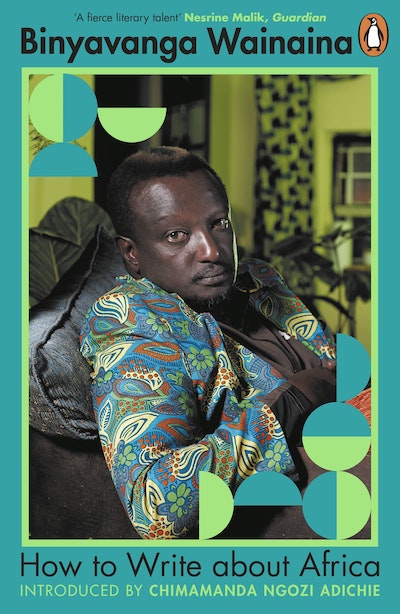- Published: 16 July 2024
- ISBN: 9780241252536
- Imprint: Penguin General UK
- Format: Paperback
- Pages: 368
- RRP: $30.00
How to Write About Africa
- Published: 16 July 2024
- ISBN: 9780241252536
- Imprint: Penguin General UK
- Format: Paperback
- Pages: 368
- RRP: $30.00
An uncompromising commentator . . . [Binyavanga Wainaina] shines a light on his continent without cliché
Nesrine Malik, Guardian
Hilarious, worldly, biting, flippant, and meaningful
Achal Prabhala, Africa is a Country
[A] Kenyan literary icon . . . [Binyavanga Wainaina's] work continues to challenge stereotypes and prejudices about Africa
The Stream
A trail-blazing Kenyan legend
Al Jazeera
[Binyavanga Wainaina's] writing dances beyond the borders of language, lineage, genre, containment . . . [His] imagination hops, skips and jumps, in that space of infinite possibilities and worlds waiting to be made and unmade
Bubblegum Club
[A] barrier-shattering presence in African literature
Washington Post
Unflagging in his generosity, unflinching and direct in his criticism, [Binyavanga] produced work in his short life that will have impact longer lasting than those whose time here is twice as long
Ellah Wakatama Allfrey
[A] Kenyan writer and LGBT activist who made a revolutionary impact on literature from and about the African continent
Margaret Busby, Guardian
Barbed, playful, inventive . . . African literature would never be the same . . . An outsize figure on the literary landscape, his omnivorous brilliance matched by ambition and vision on a continental scale
Anderson Tepper, New York Times
Everything that made Binyavanga so great was there on the page - his righteous passion, his biting wit, his eye for hypocrisy, his arch turn of phrase
Matt Weiland
Cutting and incisive, witty and confrontational, and deeply revealing
Remy Ngamjie
Wainaina's sharp wit and penetrating analysis . . . shows off his talent for withering satire
Publishers Weekly
[An] award-winning Kenyan writer whose humorous, incisive books and essays explored themes of post-colonialism, gender and sexual identity . . . with wit and humour he took apart the paternalism of certain writers who talk of Africa as one country
Independent
A collection of brilliant writing - essays, stories, journalism, and even recipes. I admire Wainaina's humour, flamboyance and intelligence and the way he skewers the usual stereotypes about Africa
Deborah Levy, Times
He was an intellectual . . . Someone who could have become the Edward Said of Africa or the James Baldwin of our time
Leila Aboulela
Both an ode and an introduction to one of the continent's most inimitable literary geniuses
Edith Amoafoa-Smart, Africa is a Country
Provocative . . . A lively selection of work that well represents the scope of this fine author
Kirkus
How to Write About Africa gathers vivid, powerful essays and fiction by the late Kenyan icon
Open Country
Seductive and appetising . . . [Wainaina’s] work is as relevant as ever [and his] observations remain sharp throughout
The New Yorker
Immensely powerful . . . How to Write about Africa set the tone for a weary scepticism about the way non-Africans behave or speak when they arrive on the continent
London Review of Books


